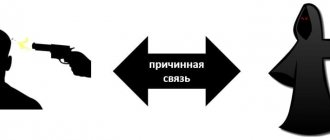Types of intent
A crime is recognized as committed with direct intent if the person who committed it was aware of the social danger of his action (inaction), foresaw the possibility or inevitability of socially dangerous consequences and desired their occurrence (Part 2 of Article 25 of the Criminal Code of the Russian Federation).
Indirect intent occurs when a person was aware of the social danger of his actions (inactions), foresaw the possibility of socially dangerous consequences, did not want, but consciously allowed these consequences or was indifferent to them (Part 3 of Article 25 of the Criminal Code of the Russian Federation).
Intention has intellectual and volitional aspects.
1. The intellectual point is:
a) in the awareness by the perpetrator of the socially dangerous nature of the act committed;
b) in anticipation of its socially dangerous consequences.
2. The volitional moment is expressed:
a) in the desire for these consequences to occur;
b) in consciously allowing these consequences to occur.
The intellectual aspect of direct and indirect intent completely coincides. The volitional moment of intent, which records the desire for the occurrence of socially dangerous consequences or their conscious assumption, belongs to the volitional sphere of the psyche of the perpetrator. The law contains indications of two possible types of volitional activity: the desire for socially dangerous consequences to occur (this type is direct intent), or the conscious assumption of the possibility of such consequences occurring (indirect intent).
Intention is the most common form of guilt in practice.
The difference between direct and indirect intent in terms of the content of the intellectual element lies in the different nature of foreseeing consequences. If direct intent is characterized by foreseeing, as a rule, the inevitability, and sometimes the real possibility of the occurrence of socially dangerous consequences, then indirect intent is characterized by foreseeing only the real possibility of the occurrence of such consequences. But the main difference between direct and indirect intent is that the subject’s volitional attitude to the consequences manifests itself in various forms. A positive attitude towards them with direct intent is expressed in desire, and with indirect intent - in a conscious assumption or in an indifferent attitude. Establishing the type of intent is very important for the correct qualification of a crime, which is confirmed by many examples.
The subjective side of the crime
1. The subjective side is the mental activity of a person, which is directly related to the commission of a crime.
Thus, the content of the subjective side is revealed with the help of such legal features as guilt, motive and purpose.
Guilt is a mandatory feature, and motive and purpose are additional signs of the subjective side of the crime.
emotions accompanying the preparation of a crime (for example, a state of passion) also have criminal legal significance But they mainly characterize the subject of the crime, that is, his mental state, and not the subjective side of the crime.
The subjective side is part of the crime as a basis for criminal liability. Thus, it allows us to distinguish between crimes that are similar in objective terms. The subjective side is taken into account when assigning punishment.
Guilt is the mental attitude of a person to the socially dangerous act he commits, as well as its consequences, if we are talking about a crime with a material element provided for by criminal law.
Guilt is one of the principles enshrined in the Criminal Code (Article 5). According to this principle, a person is subject to criminal liability only for those socially dangerous acts and socially dangerous consequences for which his guilt has been established. Objective imputation, namely criminal liability for innocent causing of harm, is not allowed.
The social essence of guilt is an antisocial (if intentional) or insufficiently expressed social attitude of a person (if careless) regarding the most important values of society.
The content of guilt is formed by intellectual and volitional elements. In view of this, the combinations of these elements provided for by law form two forms of guilt - intent and negligence. Only a person who committed an act intentionally or through negligence is found guilty of a crime.
Types of intent of the Criminal Code (Article 25) – direct and indirect intent.
A crime is considered committed with direct intent if the person:
- firstly, he was aware of the social danger of his act;
- secondly, it foresaw the possibility or inevitability of socially dangerous consequences;
- thirdly, it wanted their offensive.
In crimes with formal components, the person:
- was aware of the public danger of his act;
- wanted to do it.
Thus, awareness of the social danger of an act and foreseeing the possibility or inevitability of socially dangerous consequences are intellectual elements of direct intent , and desire is its volitional element .
A crime is considered committed with indirect intent if the person:
- was aware of the public danger of his act;
- foresaw the possibility of socially dangerous consequences;
- did not want to, but consciously allowed these consequences or was indifferent to them.
In crimes with a formal structure, indirect intent is excluded.
Awareness of the social danger of one's act ( the first intellectual element ) with indirect intent has the same content as with direct intent. But the nature of foreseeing the occurrence of socially dangerous consequences ( the second intellectual element ) with indirect intent has its own difference: a person foresees only the possibility of the occurrence of socially dangerous consequences.
The conscious assumption of socially dangerous consequences or an indifferent attitude towards them is a volitional element of indirect intent. It is in this element that the main difference between direct and indirect intent lies.
In science, there are other classifications of intent. Thus, according to the moment of occurrence, premeditated intent and sudden intent are distinguished. The latter is also divided into types: simple and affected intent.
According to the degree of certainty of the subject’s ideas about the actual and social properties of the act, specific (definite) intent and unspecified (uncertain) intent are distinguished. In turn, specific intent is divided into simple and alternative.
Crimes committed with alternative and unspecified intent should be classified depending on the socially dangerous consequences that actually occurred.
Types of intent are important for the classification of crimes, their qualification, as well as the individualization of punishment.
The Criminal Code of the Russian Federation distinguishes two types of negligence (Article 26): frivolity and negligence.
Thus, a crime is considered committed due to frivolity if the person:
- foresaw the possibility of socially dangerous consequences of his act;
- but without sufficient grounds for this, it arrogantly counted on preventing these consequences.
Frivolity in crimes with a formal structure is excluded.
The intellectual element of frivolity is the anticipation of the possibility of socially dangerous consequences of one’s actions (inaction). But in comparison with indirect intent, when the perpetrator actually foresees), with frivolity the opportunity is foreseen as abstract.
The volitional element of frivolity is arrogance, the main difference between frivolity and indirect intent (in which a person approves of the occurrence of socially dangerous consequences).
A crime is considered committed through negligence if a person: did not foresee the possibility of socially dangerous consequences of his act, although with the necessary care and forethought he should and could have foreseen these consequences.
may occur in crimes with a formal
The intellectual element of negligence is failure to foresee the possibility of the occurrence of socially dangerous consequences of one’s act in the presence of an obligation or the possibility of such foresight. Oughtness means an objective criterion, and foreseeability is a subjective criterion of negligence. To hold a person accountable, both criteria must be present.
The volitional element of negligence is the lack of volitional efforts to prevent the occurrence of these consequences. A crime is recognized as committed only through negligence if negligence is specifically mentioned in the norm of the Special Part of the Criminal Code.
If the person who committed the act did not realize and, due to the circumstances of the case, could not realize the social danger of his act, or did not foresee the possibility of socially dangerous consequences and, due to the circumstances of the case, should not or could not have foreseen them, the act is recognized as committed innocently . It is also considered innocent if the person, although he foresaw the possibility of socially dangerous consequences of his act, could not prevent these consequences due to the inconsistency of his psychophysiological qualities with the requirements of extreme conditions or neuropsychic overload.
Thus, sometimes, as a result of committing an intentional crime, grave consequences are caused that were not covered by the intent of the person, but which, according to the law, entail a more severe punishment. It is important. Since the attitude towards these consequences is characterized by a careless form of guilt (frivolity or negligence), in such cases we are talking about crimes with two forms of guilt . In general, such crimes are recognized as being committed intentionally (Article 27 of the Criminal Code).
Motive is an internal impulse determined by certain needs and interests that makes a person decide to commit a crime and by which he was guided when committing it.
The goal of a crime is a mental model of the future result that the person who committed the crime strives to achieve.
Motive and purpose have a threefold meaning , namely, they can be a mandatory sign of the main or qualified element of the crime or can be taken into account when assigning punishment as a circumstance, aggravating or mitigating the punishment.
- An error (or a subjective error) is defined as a person’s misconception regarding the factual circumstances or the legal characteristics of the act being committed.
Based on the nature of the error, individuals distinguish between legal and factual errors.
A legal error is a person’s incorrect assessment of the legal essence or legal consequences of the act committed. Such an error usually does not affect the qualification of the crime, since the assessment of the act is given by the legislator, and not by the person who committed it.
Types of legal error:
- incorrect assessment by a person of the act he commits as non-criminal, whereas in accordance with the law it is recognized as a crime;
- incorrect assessment by a person of the act being committed as criminal, whereas the law does not classify it as a crime (imaginary crime);
- incorrect assessment of the legal consequences of the crime being committed - its qualification and punishment.
A factual error is a misconception about the factual circumstances (objective signs of a crime) that determine the degree and nature of the crime.
Let us note the types of factual errors:
- error in object;
- mistake in the subject of the attack;
- mistake in the identity of the victim;
- error in the nature of the act committed;
- error regarding socially dangerous consequences;
- error in the development of causality;
- mistake in circumstances aggravating or mitigating punishment.
When there is an error in an object, a person believes that he is encroaching on one object, although in reality the damage is caused to another object. What was done in this case is qualified as an attempt on the object intended by the person (according to the direction of his intent).
Errors in the subject of the crime and in the identity of the victim do not affect the qualification of the crime unless they also entail an error in the object of the crime.
An error in the nature of the act committed lies in the fact that a person mistakenly considers his action (inaction) to be lawful and devoid of public danger. Such an error excludes intent, but does not exclude negligence when the person should and could have realized the social danger of his act and foreseen its socially dangerous consequences.
An error regarding socially dangerous consequences most often consists of a person’s misconception about the amount of harm caused. It is important. If it mistakenly believes that the harm caused will be less than what actually occurred, then liability is excluded for intentionally causing it, but remains for negligence. If a person believes that the harm caused should be greater than what actually occurred, then he will be held accountable according to the intent (for an attempted crime with a more serious consequence).
An error in the development of a causal relationship lies in the person’s misconception regarding the cause-and-effect relationship between the act he committed and the socially dangerous consequence that occurred. But only an error that leads to the onset of another socially dangerous consequence, which is the basis for a different classification of the act, has criminal legal significance.
An error in circumstances aggravating or mitigating punishment consists of a person’s erroneous belief about the absence of such circumstances when they exist, or about their presence when in reality they are absent. The act in such cases is qualified according to the intent of the perpetrator.
Types of negligence
According to Art. 26 Part I of the Criminal Code of the Russian Federation, a crime committed through negligence is recognized as an act committed through frivolity or negligence.
A crime is considered to have been committed carelessly if a person foresaw the possibility of socially dangerous consequences of his actions (inactions), but without sufficient grounds, he arrogantly hoped to prevent these consequences.
Arrogance (frivolity) differs from indirect intent in that a person foresees only the possibility of the occurrence of socially dangerous consequences of his action or inaction, but expects to prevent the occurrence of these consequences, but the calculation turns out to be frivolous. With indirect intent, there is no such calculation; the perpetrator foresees the consequences of his actions and consciously allows them, or is indifferent to them.
A crime is considered committed through negligence if a person did not foresee the possibility of socially dangerous consequences of his actions (inactions), although with the necessary care and forethought he should and could have foreseen these consequences.
Criminal negligence differs from intent and criminal frivolity in the lack of foresight of the possibility of socially dangerous consequences. In Art. 24 Part II of the Criminal Code of the Russian Federation states that an act committed through negligence is recognized as a crime only if it is specifically provided for by the relevant article of the Special Part of the Criminal Code of the Russian Federation.







